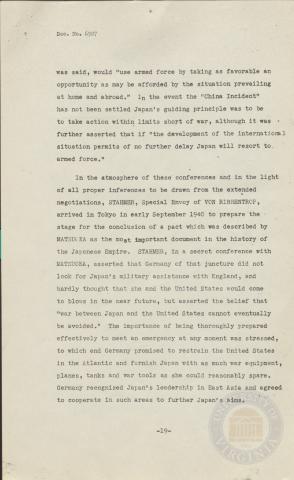
Page 19
| Parent | Doc. 6907 - Collaboration Between Japan, Germany and Italy, Volume 1 - Opening Statement |
|---|---|
| Date | |
| Language | English |
| Collection | Tavenner Papers & IMTFE Official Records |
| Box | Box 15 |
| Folder | Japan, Germany, Italy Collaboration Vol 1 |
| Repository | University of Virginia Law Library |
Doc. No. 6907
was said, would "use armed force by taking as favorable an opportunity as may be afforded by the situation prevailing at home and abroad." ln the event the "China Incident" has not been settled Japan's guiding principle was to be to take action within limits short of war, although it was further asserted that if "the development of the international situation permits of no further delay Japan will resort to. armed force."*. .
In the atmosphere of these conferences and ln the light of all proper inferences to be drawn from the extended negotiations, STAHMER, Special Envoy of VON RIBBENTROP, arrived in Tokyo in early September 1940 to prepare the • stage for the conclusion of a pact which was described by MATSDCKA as the most Important document in the history of the Japanese Empire. STAHMER, in a secret conference with MATSUOKA, asserted that Germany of that juncture did not look for Japan's military assistance with England, and hardly thought that she and the United States would come to blows in the near future, but asserted the belief that "war between Japan and the United States cannot eventually be avoided." The importance of being thoroughly prepared effectively to meet an emergency at any moment was stressed, to which end Germany promised to restrain the United States in the Atlantic and furnish Japan with as much war equipment, planes, tanks and war tools as she could reasonably spare. Germany recognized Japan's leadership in East Asia and agreed to cooperate in such areas to further Japan's aims.
